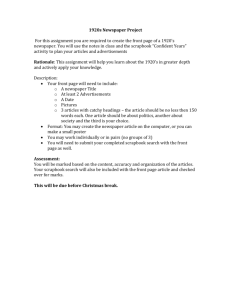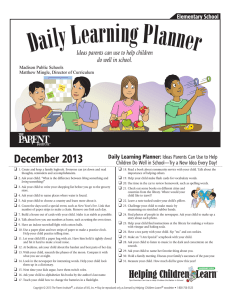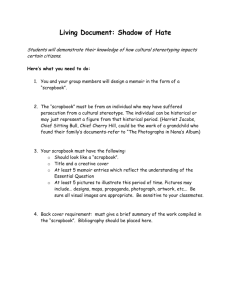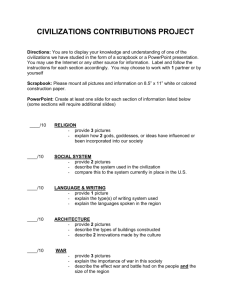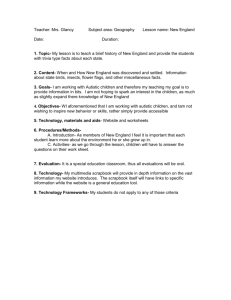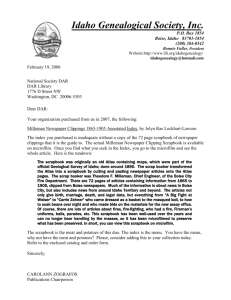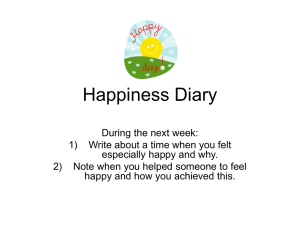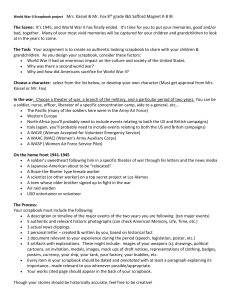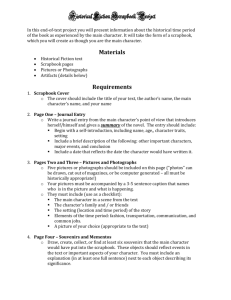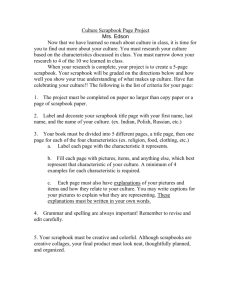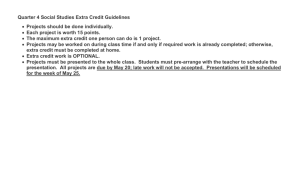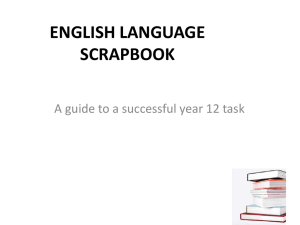APES IN THE NEWS SCRABOOK
advertisement
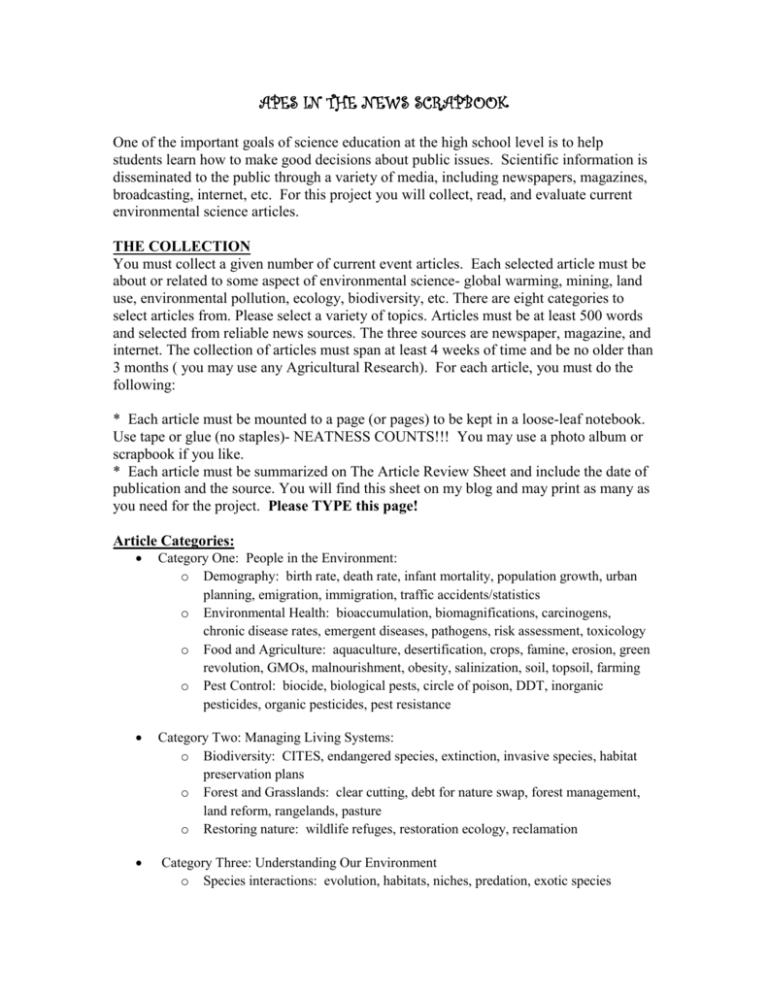
APES IN THE NEWS SCRAPBOOK One of the important goals of science education at the high school level is to help students learn how to make good decisions about public issues. Scientific information is disseminated to the public through a variety of media, including newspapers, magazines, broadcasting, internet, etc. For this project you will collect, read, and evaluate current environmental science articles. THE COLLECTION You must collect a given number of current event articles. Each selected article must be about or related to some aspect of environmental science- global warming, mining, land use, environmental pollution, ecology, biodiversity, etc. There are eight categories to select articles from. Please select a variety of topics. Articles must be at least 500 words and selected from reliable news sources. The three sources are newspaper, magazine, and internet. The collection of articles must span at least 4 weeks of time and be no older than 3 months ( you may use any Agricultural Research). For each article, you must do the following: * Each article must be mounted to a page (or pages) to be kept in a loose-leaf notebook. Use tape or glue (no staples)- NEATNESS COUNTS!!! You may use a photo album or scrapbook if you like. * Each article must be summarized on The Article Review Sheet and include the date of publication and the source. You will find this sheet on my blog and may print as many as you need for the project. Please TYPE this page! Article Categories: Category One: People in the Environment: o Demography: birth rate, death rate, infant mortality, population growth, urban planning, emigration, immigration, traffic accidents/statistics o Environmental Health: bioaccumulation, biomagnifications, carcinogens, chronic disease rates, emergent diseases, pathogens, risk assessment, toxicology o Food and Agriculture: aquaculture, desertification, crops, famine, erosion, green revolution, GMOs, malnourishment, obesity, salinization, soil, topsoil, farming o Pest Control: biocide, biological pests, circle of poison, DDT, inorganic pesticides, organic pesticides, pest resistance Category Two: Managing Living Systems: o Biodiversity: CITES, endangered species, extinction, invasive species, habitat preservation plans o Forest and Grasslands: clear cutting, debt for nature swap, forest management, land reform, rangelands, pasture o Restoring nature: wildlife refuges, restoration ecology, reclamation Category Three: Understanding Our Environment o Species interactions: evolution, habitats, niches, predation, exotic species o o Biomes: barrier islands, chapparals, coral reefs, grasslands, estuaries, rainforest, taiga, etc. Biogeochemical cycles: any type of disruption in the water, carbon, sulfur, phosphorous or nitrogen cycles Category Four: Physical Resources o Geology: mineral uses, ore uses, mining, smelting, rock cycle, rocks, volcanoes, earthquakes, tectonic plates, weathering, dinosaurs o Meteorology: drought, hurricanes, jet stream, El Nino, air currents, monsoons, heat waves, flooding o Earth Science: season, tides, moon cycle Category Five: Solid, Toxic, and Hazardous Waste o Waste: land fills, brownfields, Superfund, waste to energy, toxic waste, nuclear waste, medical waste, composting, e-waste, incineration o Recycle: waste reduction, recycling, reusing, reducing Category Six: Pollution (Air, Water, Land) o Air: acid rain, CFC’s, greenhouse effect, ozone depletion, sulfur dioxide, health affects due to dirty air o Water: biomagnifications, bioaccumulation, eutrophication, discharge, water treatment plants, rain shadow, water table, water stress, floods o Land: landfills, over grazing, top soil Category Seven: Energy (Conventional and Sustainable) o Conventional: coal, oil, natural gas, and nuclear o Sustainable: wind, solar, tidal, biomass, biogas, etc. Category Eight: Toss Up o This category is open to you for those articles that you find interesting and that you can defend to be part of your APES in the News Scrapbook. Article Sources: Newspaper: AJC, Marietta Daily Journal, USA Today, New York Times, Chicago Times, or any other PRINT newspaper. The newspaper article may come from the online version of a newspaper. Magazine or Journal: National Geographic, Audubon Society, Popular Mechanics, Astronomy, Nutrition Newsletter, Journal of American Medicine, Agricultural Research etc. Magazine or Journal must be published and not on the internet. Internet: Professional web sites such as USGS, USFW, Congressional home pages, United Nations, or other sites that have articles published by an author. THE ANALYSIS Once all of your articles have been collected, you must do the following: * Title Page: Give your scrapbook a title that reflects something about the project. BE CREATIVE! * Organization Scheme- your scrapbook must be organized in some topical manner (not chronological or by source.) You must include a typed Table of Contents that demonstrates your organization plan. Please write a short paragraph explanation of your scheme/theme on your Table of Contents page. THE GRADE Provided that you adequately meet the above criteria (neatness, creativity, summaries, title page, scheme relevance), your grade will be determined by the number of articles you have collected, thoroughness of your review and the rubric guidelines. No more than 5 articles from one source please!! DUE DATE Early Bird Special Regular due date Article Review Sheet This form must be attached on the page behind article & filled out completely or no credit will be earned. Student Name: _________________________________________ Article Number: __________ Circle correct category: 1 2 3 4 5 6 7 8 Article title: ____________________________________________________________ Article Author: _________________________________________________________ Source of Article: ___________________________ Publication date:______________________ Each box should have a minimum of 3 complete sentences. If you can not find the information in the article that goes in the box then it is a pretty safe assumption that your article is not valid for your current events binder. You must type you information . 1. Facts 2. Statistics 3. Examples 4. Expert Authority 5. Logic and Reasoning
